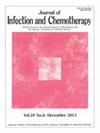Purpura fulminans caused by Streptococcus pneumoniae serotype 23A in a young post-splenectomy man: A case report
IF 1.5
4区 医学
Q3 INFECTIOUS DISEASES
引用次数: 0
Abstract
Purpura fulminans is a rare but severe complication of septic shock, often associated with Streptococcus pneumoniae infection in asplenic individuals, with high mortality and limb amputation risk. Although pneumococcal vaccines are available, infections caused by non-vaccine serotypes remain a major concern. A 39-year-old man with a history of splenectomy 18 years prior presented with dyspnea, malaise, and gastrointestinal symptoms for two days. He had never received pneumococcal vaccination following his splenectomy. On arrival, he was hypotensive, tachycardic, and exhibited signs of multi-organ failure with severe coagulopathy. Physical examination revealed widespread cyanosis and purpura. Blood cultures yielded penicillin-susceptible S. pneumoniae, later identified as serotype 23A (Sequence Type 5242), which is not included in currently available vaccines in Japan. Despite prompt intensive care, including broad-spectrum antibiotics, vasopressors, continuous renal replacement therapy, and mechanical ventilation, the patient developed progressive skin necrosis at the distal extremities. Ultimately, he required amputation of all 4 limbs. This case underscores the catastrophic consequences of overwhelming post-splenectomy infection due to a non-vaccine S. pneumoniae serotype in an unvaccinated asplenic adult. Early recognition and aggressive management are essential to save lives, but structured, lifelong pneumococcal vaccination and increased awareness among clinicians and patients remain paramount.
脾切除术后由23A型肺炎链球菌引起的暴发性紫癜1例。
暴发性紫癜是一种罕见但严重的脓毒性休克并发症,通常与无脾个体的肺炎链球菌感染有关,具有高死亡率和截肢风险。虽然肺炎球菌疫苗是可用的,但由非疫苗血清型引起的感染仍然是一个主要问题。39岁男性,18年前有脾切除术史,因呼吸困难、不适和胃肠道症状2天。他在脾切除术后从未接种过肺炎球菌疫苗。到达时,他有低血压,心动过速,并表现出多器官衰竭的迹象,伴有严重的凝血功能障碍。体格检查发现广泛的紫绀和紫癜。血液培养产生青霉素敏感肺炎链球菌,后来确定为血清型23A(序列型5242),日本目前可用的疫苗中不包括这种链球菌。尽管患者得到了及时的重症监护,包括广谱抗生素、血管加压药、持续肾替代治疗和机械通气,但患者在远端肢体出现了进行性皮肤坏死。最终,他需要截肢。本病例强调了在未接种疫苗的无脾成人中,由于未接种疫苗的肺炎链球菌血清型导致压倒性的脾切除术后感染的灾难性后果。早期识别和积极管理对于挽救生命至关重要,但有组织的终身肺炎球菌疫苗接种和提高临床医生和患者的认识仍然至关重要。
本文章由计算机程序翻译,如有差异,请以英文原文为准。
求助全文
约1分钟内获得全文
求助全文
来源期刊

Journal of Infection and Chemotherapy
INFECTIOUS DISEASES-PHARMACOLOGY & PHARMACY
CiteScore
4.10
自引率
4.50%
发文量
303
审稿时长
47 days
期刊介绍:
The Journal of Infection and Chemotherapy (JIC) — official journal of the Japanese Society of Chemotherapy and The Japanese Association for Infectious Diseases — welcomes original papers, laboratory or clinical, as well as case reports, notes, committee reports, surveillance and guidelines from all parts of the world on all aspects of chemotherapy, covering the pathogenesis, diagnosis, treatment, and control of infection, including treatment with anticancer drugs. Experimental studies on animal models and pharmacokinetics, and reports on epidemiology and clinical trials are particularly welcome.
 求助内容:
求助内容: 应助结果提醒方式:
应助结果提醒方式:


